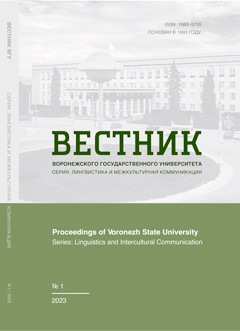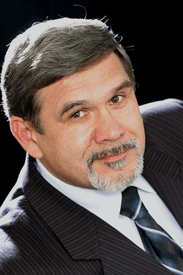Функциональный нуль в фонологической системе русского языка
Аннотация
Статья развивает нетрадиционный взгляд на состав основных классов фонем в русском языке, представленный в нашей статье «О классах фонем в русском языке». В качестве таких классов были рассмотрены консонанты, сонанты, глайды и гласные. Целью данной статьи является выделение функционального нулевого фона (звука) в составе глайдов и гласных. Обосновано функционирование нулевого йота и вокалического нуля в фонетических позициях. Для нулевого йота такой позицией оказывается реализация фонемы [j] перед гласным «и» – [`ы] в начале слова (избА, Избы), между гласными перед безударным гласным «и» (сУдьи, свАи, сарАи). В классе гласных в качестве функционального нуля представлена реализация фонемы [a] в особых звательных формах типа Вов! (Вова), Люд! (Люда). Он обозначен как па-звук [#]. Термин же «вокалический нуль», представленный в работах В. Г. Руделева, рассматривается не как обозначение собственно нулевого фона (звука), а как полноценная самостоятельная гласная фонема («ер»), функциональным фоном которой является фон [ъ]. Он характеризуется с точки зрения традиционных фонетических признаков как неогубленный гласный среднего ряда и среднего подъема. В фонологическом плане ему присущи такие акустические признаки, как небемольность, недиффузность, некомпактность, низкий тон. Основное различие между фонемой [ъ] и функциональным вокалическим нулем [#] (па-звуком) в следующем; [ъ] является слоговым, а [#] – неслоговым. Отсутствие восприятия звуковой материальности в силу краткости па-звука характеризует его как функционально значимый сегмент неслогового типа. Это определяет нулевую сущность па-звука и тем самым отличает его от подлинных гласных. Правомерность выделения функциональных нулей обусловлена парадигматической формой выявления данных единиц в системном описании звукового строя русского языка.
Скачивания
Литература
2. Kretov A. A. Systemic Russian phonemology. Voronezh: Publishing House of VSU, 2020. Vol. 1. 198 p.
3. Rudelev V. G., Piskunova S. V. Russian consonants. In: Phonology. Tambov: TSPI, 1982. Pp. 166–170.
4. Panov M. V. Modern Russian language. Phonetics. M.: Higher School, 1979. 256 p.
5. Moiseev A. I. Russian language. Phonetics. Morphology. Orthography. M.: Enlightenment, 1975. 240 p.
6. Akhmanova O. S. Dictionary of linguistic terms. Moscow: Soviet Encyclopedia, 1969. 608 p.
7. Zubkova L. G. Language as a form: Theory and history of linguistics. Moscow: RUDN Publishing House, 1999. 237 p.
8. Modern Russian literary language. Edited by P. A. Lekant. M.: Higher School, 1982. 399 p.
9. Vinogradov V. A. Consonantism and vocalism of the Russian language: Practical phonology. Moscow: Moscow University Press, 1971. 85 p.
10. Eskova N. A. Selected works on Russian studies: Phonology. Morphonology. Morphology. Spelling. Lexicography. M.: Languages of Slavic cultures, 2011. 647 p.
11. Rudelev V. G. Vocal zero and its place in the system of vocal phonemes. In: Materials and tez. dokl. XV totals. scientific conf. Orenburg: Orenburg State Pedagogical Institute named after V. P. Chkalov, 1967.
12. Reformatsky A. A. From the history of Russian phonology. M.: Nauka, 1970. 528 p.
13. The Russian language in its functioning: Language levels. Moscow: Nauka, 1996. 271 p.
14. Aksakov K. S. The experience of Russian grammar. Part 1. M.: Type. L. Stepanova, 1860. 176 p.
15. Kretov A. A., Popova Z. D. Syllabic nature of the Russian phoneme. In: Philological notes. Voronezh, 1996. Issue 7. Pp. 98–118.
16. Stepanov Yu. S. On the dependence of the concept of phoneme on the concept of syllable in synchronous description and historical reconstruction. In: Questions of Linguistics. 1974. No. 5. Pp. 96–106.
17. Sharandin A. L. Problems of Russian phonetics, graphics, spelling. Tambov: Publishing house Pershina R. V., 2006. 348 p.
18. Gamkrelidze T. V., Ivanov V. V. Indo-European language and Indo-Europeans. Tbilisi: Publishing House of the Tbilisi University, 1984.













